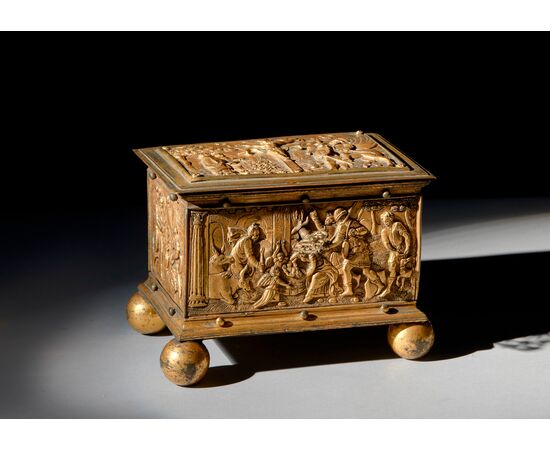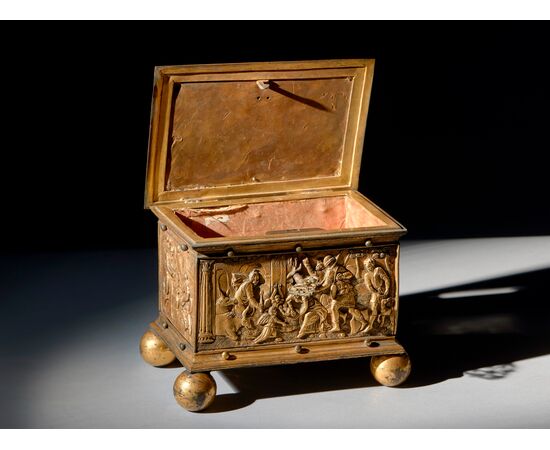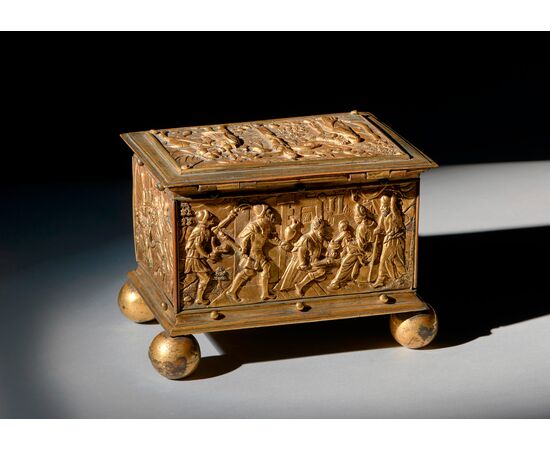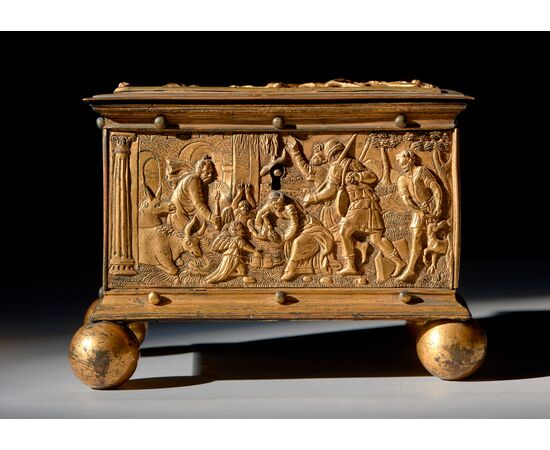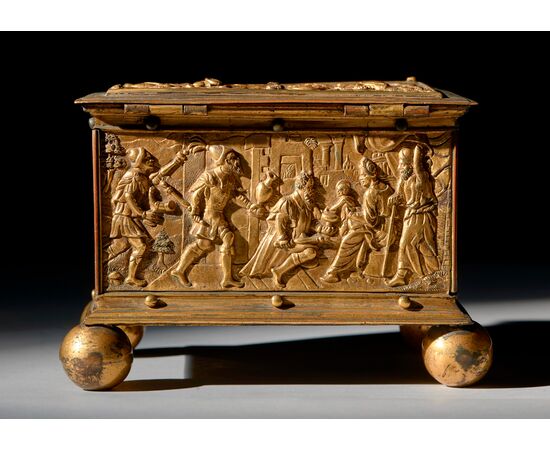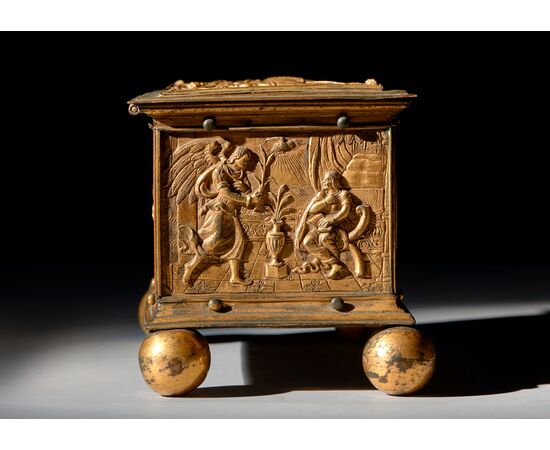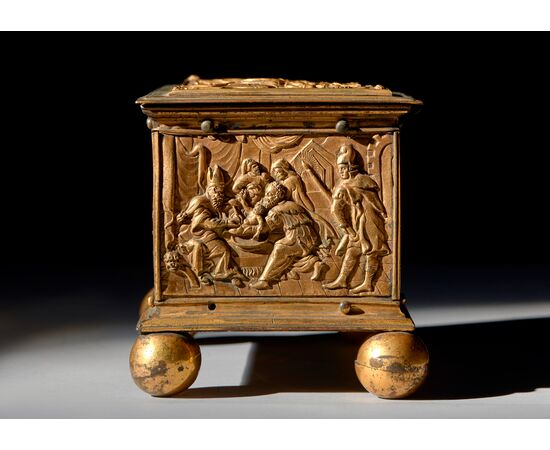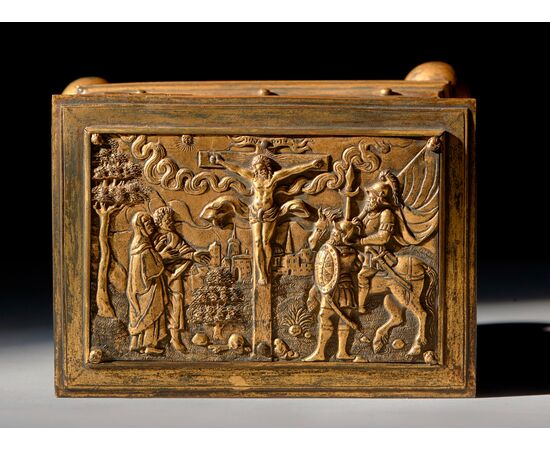Cassettina in bronzo e rame dorato, centro Europa, XVI° secolo
Cassettina in bronzo e rame dorato, centro Europa, XVI° secolo
Dimensioni: cm 13 x 17,2 x 12,2
Poggiante a terra mediante quattro piedi sferici in bronzo dorato questa splendida cassettina presenta una struttura a cornici lineari, sulle quali sono fissate, per mezzo di deliziosi piccoli chiodi in metallo ribattuti, cinque raffinatissime formelle istoriate in rame dorato.
Le stesse, finemente lavorate a rilievo e cesello, sono ricchissime di particolari, palesando un’elevata qualità esecutiva.
Il tema rappresentato è la vita di Gesù.
Formella laterale sinistra
La prima in ordine cronologico.
Rappresentata è l’Annunciazione.
La scena si svolge sotto un porticato, dove Maria, seduta, sta leggendo un libro.
Essa è sorpresa dall’arcangelo Gabriele che, in piedi e recante nella mano destra il classico giglio, annuncia alla Vergine il lieto evento.
Da sottolineare l’equilibrio della composizione e l’eleganza dei panneggi negli abiti dei due personaggi.
Da notare inoltre la qualità esecutiva delle ali dell’arcangelo, quella del vaso posto tra i due e del pavimento, capace di regalare, in una così piccola superficie, una chiara idea prospettica alla scena.
Formella frontale:
Rappresentata è l’Adorazione dei Pastori
La scena si svolge al limitare tra una grotta/tempio, rappresentata con architetture di vario genere; e l’esterno, rappresentato con un soffice manto erboso sul quale si possono scorgere alcuni sassi, un corso d’acqua e degli alberi.
Gesù è dolcemente appoggiato da Maria nella culla/mangiatoia, sorvegliato da due Angeli, illuminato da una candela sorretta da San Giuseppe e riscaldato dal bue e dall’asino.
Qui riceve l’adorazione dei pastori, che, nelle classiche vesti, e accompagnati dall’inseparabile cane, vengono a fare visita al Neonato.
Formella posteriore
L’adorazione dei Magi
Anche in questo caso la scena si svolge in un ambiente a metà tra l’interno e l’esterno
La Sacra Famiglia è stavolta rappresentata sul lato destro della composizione.
Giuseppe è in piedi appoggiato a un bastone, alle spalle di Maria che, seduta, tiene in braccio Gesu Bambino.
I tre Magi, in abiti sontuosi, portano a Gesù i classici doni…oro, argento e mirra.
Il Bambino, è stavolta rappresentato molto vigile e interloquisce direttamente con il Magio a lui più vicino, toccando con la mano il dono contenuto in un elegante vaso che gli viene porto.
Anche in questo caso la formella risulta molto piacevole, equilibrata e ricca di particolari.
Formella laterale destra
La circoncisione
Otto giorni dopo la sua nascita Gesù fu circonciso secondo la prassi ebraica della Milah.
La scena si svolge nell’interno di un edificio, forse il tempio di Gerusalemme, o presso la casa di Giuseppe.
Alla luce di una torcia sostenuta da un uomo in piedi sulla destra, il sommo sacerdote, seduto su di un elegante sedile decorato con un mascherone, opera a Gesù la circoncisione.
Il Bambino è trattenuto da Giuseppe, e alle sue spalle si vede una donna, probabilmente Maria.
Un quinto uomo è in piedi sullo sfondo.
Il punto focale della rappresentazione è leggermente decentrato sulla sinistra della formella.
Qui si raccolgono la maggior parte dei personaggi ed in particolare in primo piano è descritto il momento esatto durante il quale il sommo sacerdote esegue, con l’ausilio di un piccolo coltello, l’operazione.
Formella superiore
La Crocifissione
Avvenimento considerato dai cristiani l’evento culminante attraverso il quale Cristo, con il proprio sacrificio, ha operato la salvezza del popolo dal peccato.
La crocifissione di Gesu avvenne sul monte Golgota.
Sullo sfondo della formella è visibile la città di Gerusalemme, al centro, in primo piano Cristo crocifisso, con al Suo fianco, sul lato sinistro, le dolenti figure di Maria e dell’ ”apostolo prediletto” che affrante pregano guardando in direzione di Gesù.
Sul lato opposto due soldati, uno a piedi armato di scudo e lancia e il secondo a cavallo di un elegante destriero, controllano la triste scena.
Anche questa formella si presenta ricca di dettagli: l’accuratezza con la quale sono eseguite le figure, le architetture, il cielo con il piccolo sole e il grande vortice di nuvole pronte a coprirlo, il terreno, ricoperto d’erba, sassi, e alberi.
Tutto è realizzato con maestria e grande attenzione ai particolari, donando al cofanetto un importante valore aggiunto che, sommandosi a quelli dell’elegante impianto architettonico e delle equilibrate proporzioni lo rende un opera veramente piacevole e raffinata.
L'opera, come ogni altro nostro oggetto, sarà venduta corredata da attestato di autenticità.
Ci occupiamo e organizziamo personalmente l'imballaggio e la spedizione delle opere d'arte con assicurazione in tutto il mondo
L’oggetto è provvisto del permesso di libera circolazione, rilasciato dal Ministero per i beni culturali, che ne certifica l’epoca, il valore e la dà al bene la possibilità di essere esportato.
English
Bronze and gilded copper box, Central Europe, 16th century
Dimensions: 13 x 17.2 x 12.2 cm
Resting on the ground by means of four spherical feet in gilded bronze, this splendid little box has a structure with linear frames, on which five very refined historiated panels in gilded copper are fixed by means of delightful small hammered metal nails.
The same, finely worked in relief and chisel, are very rich in details, revealing a high executive quality.
The theme represented is the life of Jesus.
Left side panel
The first in chronological order.
Represented is the Annunciation.
The scene takes place under a portico, where Mary is seated and reading a book.
She is surprised by the Archangel Gabriel who, standing and holding the classic lily in his right hand, announces the happy event to the Virgin.
To underline the balance of the composition and the elegance of the drapery in the clothes of the two characters.
Also note the executive quality of the archangel's wings, that of the vase placed between the two and of the floor, capable of giving, in such a small surface, a clear perspective idea to the scene.
Front tile:
Represented is the Adoration of the Shepherds
The scene takes place on the edge of a cave/temple, represented with various types of architecture; and the exterior, represented with a soft turf on which you can see some stones, a stream and trees.
Jesus is gently supported by Mary in the cradle / manger, watched over by two Angels, lit by a candle supported by St. Joseph and warmed by the ox and the donkey.
Here he receives the adoration of the shepherds, who, in classic clothes, and accompanied by the inseparable dog, come to visit the newborn.
Rear tile
The adoration of the Magi
Also in this case the scene takes place in an environment halfway between inside and outside
The Holy Family is this time represented on the right side of the composition.
Joseph is standing leaning on a stick behind Mary who is seated and holds the Child Jesus in her arms.
The three Magi, in sumptuous clothes, bring Jesus the classic gifts… gold, silver and myrrh.
This time the Child is represented very alert and speaks directly with the Magi closest to him, touching with his hand the gift contained in an elegant vase that is brought to him.
Also in this case the tile is very pleasant, balanced and full of details.
Right lateral panel
Circumcision
Eight days after his birth, Jesus was circumcised according to the Jewish practice of the Milah.
The scene takes place inside a building, perhaps the temple of Jerusalem, or at the house of Joseph.
In the light of a torch held by a man standing on the right, the high priest, seated on an elegant seat decorated with a mask, circumcises Jesus.
The Child is held by Joseph, and a woman, probably Mary, can be seen behind him.
A fifth man is standing in the background.
The focal point of the representation is slightly off center on the left of the panel.
Here most of the characters are gathered and in particular in the foreground the exact moment is described during which the high priest performs the operation with the aid of a small knife.
Upper tile
The Crucifixion
An event considered by Christians to be the culminating event through which Christ, with his own sacrifice, brought about the salvation of the people from sin.
Jesus' crucifixion took place on Mount Golgotha.
In the background of the panel the city of Jerusalem is visible, in the center, in the foreground Christ crucified, with beside him, on the left side, the mournful figures of Mary and the "beloved apostle" who in grief pray looking in the direction of Jesus .
On the opposite side, two soldiers, one on foot armed with a shield and spear and the second riding an elegant steed, watch over the sad scene.
Also this panel is rich in details: the accuracy with which the figures, the architectures are executed, the sky with the small sun and the great swirl of clouds ready to cover it, the ground, covered with grass, stones, and trees.
Everything is made with skill and great attention to detail, giving the box an important added value which, added to those of the elegant architectural structure and balanced proportions, makes it a truly pleasant and refined work.
The work, like all our other objects, will be sold accompanied by certificates of authenticity and lawful origin.
We personally take care of and organize the packing and shipping of the artworks with insurance all over the world
The object is provided with the free movement permit, issued by the Ministry of Cultural Heritage, which certifies its age, value and gives the object the possibility of being exported.
Français
Boîte en bronze et cuivre doré, Europe centrale, XVIe siècle
Dimensions : 13 x 17,2 x 12,2 cm
Reposant au sol au moyen de quatre pieds sphériques en bronze doré, ce splendide petit coffret présente une structure à armatures linéaires, sur laquelle cinq panneaux historiés très raffinés en cuivre doré sont fixés au moyen de ravissants petits clous en métal martelé.
Les mêmes, finement travaillés en relief et au burin, sont très riches en détails, révélant une grande qualité d'exécution.
Le thème représenté est la vie de Jésus.
Panneau latéral gauche
Le premier dans l'ordre chronologique.
L'Annonciation est représentée.
La scène se déroule sous un portique, où Marie est assise et lit un livre.
Elle est surprise par l'Archange Gabriel qui, debout et tenant le lys classique dans sa main droite, annonce l'heureux événement à la Vierge.
Souligner l'équilibre de la composition et l'élégance du drapé dans les vêtements des deux personnages.
A noter également la qualité exécutive des ailes de l'archange, celle du vase placé entre les deux et du sol, capable de donner, dans une si petite surface, une idée claire de perspective à la scène.
Tuile avant :
Représenté est l'Adoration des Bergers
La scène se déroule au bord d'une grotte/temple, représentée avec différents types d'architecture ; et l'extérieur, représenté avec un gazon doux sur lequel on peut voir des pierres, un ruisseau et des arbres.
Jésus est doucement soutenu par Marie dans le berceau/crèche, veillé par deux anges, éclairé par un cierge soutenu par saint Joseph et réchauffé par le bœuf et l'âne.
Ici, il reçoit l'adoration des bergers qui, en habits classiques, et accompagnés de l'inséparable chien, viennent rendre visite au nouveau-né.
Tuile arrière
L'adoration des mages
Dans ce cas également, la scène se déroule dans un environnement à mi-chemin entre l'intérieur et l'extérieur
La Sainte Famille est cette fois représentée sur le côté droit de la composition.
Joseph est debout appuyé sur un bâton derrière Marie qui est assise et tient l'Enfant Jésus dans ses bras.
Les trois mages, vêtus de vêtements somptueux, apportent à Jésus les cadeaux classiques… l'or, l'argent et la myrrhe.
Cette fois l'Enfant est représenté très alerte et s'adresse directement aux Mages les plus proches de lui, touchant de la main le cadeau contenu dans un élégant vase qui lui est apporté.
Dans ce cas également, la tuile est très agréable, équilibrée et pleine de détails.
Panneau latéral droit
Circoncision
Huit jours après sa naissance, Jésus a été circoncis selon la pratique juive de la Milah.
La scène se passe à l'intérieur d'un bâtiment, peut-être le temple de Jérusalem, ou chez Joseph.
A la lueur d'une torche tenue par un homme debout à droite, le grand prêtre, assis sur un siège élégant orné d'un masque, circoncit Jésus.
L'Enfant est tenu par Joseph, et une femme, probablement Marie, est visible derrière lui.
Un cinquième homme se tient à l'arrière-plan.
Le point focal de la représentation est légèrement décentré sur la gauche du panneau.
Ici la plupart des personnages sont réunis et en particulier au premier plan est décrit le moment exact pendant lequel le grand prêtre effectue l'opération à l'aide d'un petit couteau.
Tuile supérieure
La crucifixion
Un événement considéré par les chrétiens comme l'événement culminant par lequel le Christ, par son propre sacrifice, a réalisé le salut du peuple du péché.
La crucifixion de Jésus a eu lieu sur le mont Golgotha.
À l'arrière-plan du panneau, la ville de Jérusalem est visible, au centre, au premier plan le Christ crucifié, avec à côté de lui, sur le côté gauche, les figures lugubres de Marie et de "l'apôtre bien-aimé" qui, dans la douleur, prient en regardant dans le direction de Jésus.
De l'autre côté, deux soldats, l'un à pied armé d'un bouclier et d'une lance et le second monté sur un élégant destrier, veillent sur la triste scène.
Aussi ce panneau est riche de détails : la justesse avec laquelle les figures, les architectures sont exécutées, le ciel avec le petit soleil et le grand tourbillon de nuages prêts à le recouvrir, le sol, couvert d'herbe, de pierres et d'arbres.
Tout est fait avec habileté et une grande attention aux détails, donnant à la boîte une valeur ajoutée importante qui, ajoutée à celles de la structure architecturale élégante et des proportions équilibrées, en fait une œuvre vraiment agréable et raffinée.
L'œuvre, comme tous nos autres objets, sera vendue accompagnée de certificats d'authenticité et d'origine licite.
Nous nous occupons et organisons personnellement l'emballage et l'expédition des œuvres avec assurance dans le monde entier
L'objet est muni du permis de libre circulation, délivré par le ministère du Patrimoine culturel, qui certifie son âge, sa valeur et donne à l'objet la possibilité d'être exporté.

